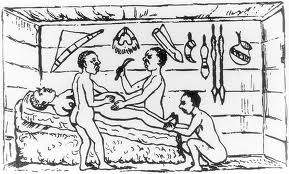Today’s Proof of BLACKNESS: AFRICAN (BLACK) MEDICINE
Africans and Black people are hardly ever given credit in mainstream media outlets, standard textbooks, his-story books, etc., nonetheless, African wisdom contributed tremendously towards the development of modern day medicine. For example, in Western Africa during the Songhai Empire when Europe was still in its Dark Ages around 1457 AD, the city of Jeanne had a medical school which employed hundreds of teachers and was well-known internationally for training surgeons in difficult operations like cataract surgery. They taught the pharmacological use of over one thousand animal and plant products for the treatment of medical illnesses!
——-
Many of these same medicines in liquid or pill forms are still used today like castor seeds which were used for constipation, and castor oil which is still used today. Kaolin, used for diarrhea, is still used today in kaopectate, and Ox liver, rich in vitamin “A” was used to treat night blindness caused by a deficiency of vitamin “A”. Onions, which have a high vitamin C content, were used to treat a Vitamin “C” deficiency. Was credit given to Blacks in West Africa, hell no!
The ancient people of Kemet (egyptians), who far exceeded the rest of the ancient world in medical knowledge, knew much about antibiotic penicillin and its therapeutic properties. The presence of the antibiotic tetracycline however, appears only in the bones of farmers from northern Sudan about 1500 years ago, who discovered that streptomyces molds easily produce tetracycline on stored grain and purposefully used tetracycline to treat infections. No evidence exists to indicate that the tetracycline antibiotic, which was not rediscovered until the twentieth century, has been used anywhere else in the world.
——-

About half of the modern pharmacological medicines are derived from traditional African medicinal herbs. The Yoruba of Nigeria used the plant Rauwolfia vomitoria as a sedative to calm agitated or psychotic patients, and modern medicine has been able to isolate a substance called Reserpine which can also lower blood pressure from this same plant, and market it for the same purpose.
——-
 Around 1721 in America, Onesimus, an African slave taught his master an age old African technique used to inoculate smallpox where a pustule from an infected person was broken with a thorn and then used to puncture the skin of a healthy person. Subsequently, during a smallpox epidemic in the Boston, MA area, 241 healthy people were inoculated using this African technique, and only six contracted smallpox. During the American Revolutionary War, George Washington had inoculated his entire army against smallpox using this African procedure, which was only modified in the 1790’s by Dr. Edward Jenner who altered the African smallpox inoculation technique simply by using a less hazardous type of smallpox germ. White folks still don’t realize the power of black minds!
Around 1721 in America, Onesimus, an African slave taught his master an age old African technique used to inoculate smallpox where a pustule from an infected person was broken with a thorn and then used to puncture the skin of a healthy person. Subsequently, during a smallpox epidemic in the Boston, MA area, 241 healthy people were inoculated using this African technique, and only six contracted smallpox. During the American Revolutionary War, George Washington had inoculated his entire army against smallpox using this African procedure, which was only modified in the 1790’s by Dr. Edward Jenner who altered the African smallpox inoculation technique simply by using a less hazardous type of smallpox germ. White folks still don’t realize the power of black minds!
——-
In Europe, as recently as 1880 AD, the mortality rate was about one hundred percent for mothers delivering babies by caesarian section, a technique that was only used to save the life of the infant. However, Dr. R. W. Felkin shocked the European medical community when in the Edinburgh Medical Journal of 1884, he published that the Banyoro surgeons in Uganda routinely performed caesarian sections without any harmful effects to the mother or the child.
——-
A group of European surgeons then went to study in Uganda for six months before successfully learning the advanced surgical techniques that were common place for the Africans. The European surgeons were also taught sophisticated concepts of anesthesia and antisepsis such as the routinely washing of their hands and the mother’s abdomen with alcohol prior to surgery, so as to prevent infection.
——-
This should tell you something about the plight and contributions of Black people in the world. Many of these deeds go uncredited, respected and aren’t discussed. Mainly, because those who truly run this world do not want you to know the truth. But the fight for respect and recognition continues….
///////

